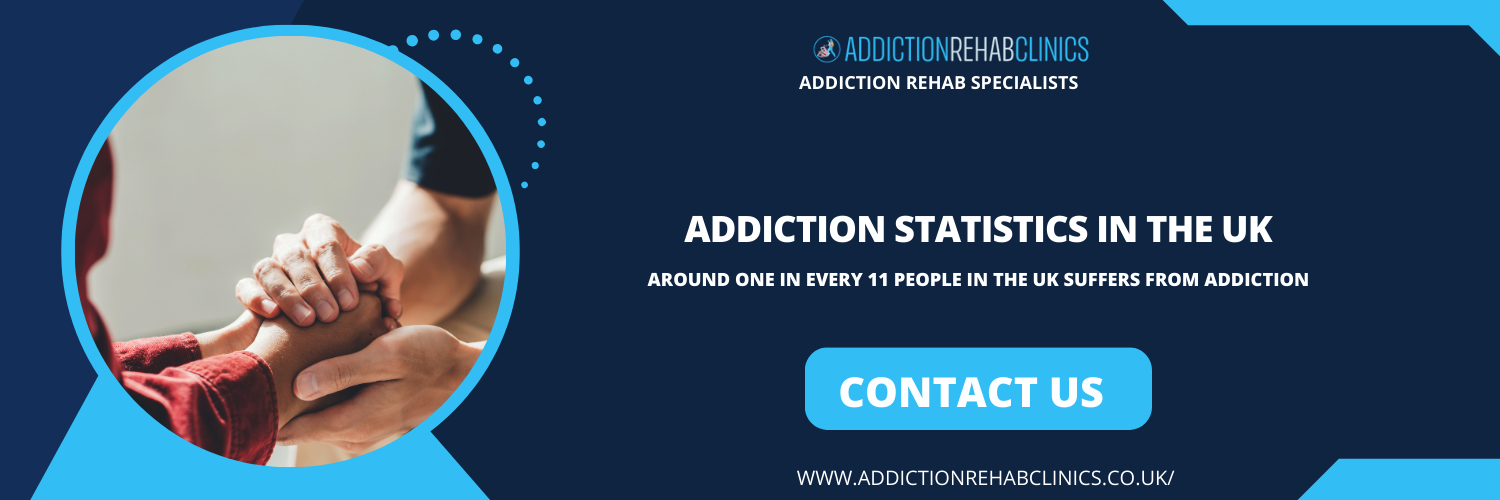20+ Years Experience
Specialist Addiction Rehab

Addiction is a chronic and often relapsing disorder characterised by compulsive use of a substance or engagement in a behaviour despite its negative consequences. It is a complex condition that can have severe physical, psychological, and social consequences.
According to statistics from the National Health Service (NHS), around one in every 11 people in the UK suffers from addiction. This equates to around 2.7 million people. The most common addictions in the UK include alcohol, drugs, gambling, and pornography.
In terms of age groups, addiction primarily affects those aged 16-24 in the UK, followed by those aged 25-34. However, addiction can affect people of all ages and backgrounds.
The causes of addiction in the UK are multifaceted and can include both genetic and environmental factors. Studies have shown that individuals with a family history of addiction are at a higher risk of developing an addiction themselves. Environmental factors, such as exposure to substance use, peer pressure, and stressful situations, can also contribute to the development of an addiction.
The effects of addiction in the UK are far-reaching and can impact an individual’s mental health, relationships, and financial stability. Those struggling with addiction are at a higher risk of developing mental health disorders, such as depression and anxiety. Additionally, the social and economic effects of addiction can be significant, not only for the individual but for their loved ones as well.
Treatment for addiction in the UK typically involves a combination of therapy, medication, and support groups. The success rate of addiction treatment varies depending on the individual and the type of addiction being treated. However, with the right treatment and support, recovery from addiction is possible.
There are numerous support groups available for addiction in the UK, such as Alcoholics Anonymous and Narcotics Anonymous. These groups provide a sense of community and understanding for those struggling with addiction and can be a valuable resource in the recovery process.
Addiction is a complicated problem defined by the compulsive use of substances or engaging in certain behaviours despite the negative consequences. I
t is a long-term brain disorder that affects the systems responsible for reward, motivation, and memory. Addiction can involve substances such as drugs or alcohol, as well as activities like gambling or gaming.
It often starts as a voluntary choice but can develop into an uncontrollable and compulsive habit. Genetics, environment, and mental health are factors that can contribute to the development of addiction.
Seeking professional help and support from loved ones are crucial steps in overcoming addiction.
Common types of addiction include:
These addictions can have severe physical, psychological, and socioeconomic consequences. While substance addictions are widely recognised, behavioural addictions are gaining more attention.
Understanding the most common types of addiction is crucial for early recognition and intervention.
Treatment options for addiction vary depending on the type and severity of addiction but often involve a combination of therapy, medication, and support groups.

Addiction in the UK is a major problem, with a large number of people affected. Recent statistics show that approximately 2.7 million individuals in the UK struggle with various types of addiction.
This includes addictions to drugs and alcohol, as well as behavioural addictions such as gambling. The high prevalence of addiction in the UK can result in significant social and economic impacts.
Therefore, it is crucial for individuals and communities to have access to effective prevention and treatment services in order to tackle this public health issue.
Addiction affects a significant number of people in the UK. To understand the scale of the issue, follow these steps:
The most common addictions in the UK include:
It is important to address these addictions through effective treatment and support services in order to improve the overall well-being of individuals and reduce their impact on society.
According to recent addiction statistics in the UK, 1 in 10 adults are addicted to drugs, alcohol, or gambling, while 1 in 8 have a behavioural addiction such as gaming or shopping.
The most common types of addiction in the UK include alcohol, nicotine, and prescription drugs. However, there has been a significant increase in behavioural addictions such as internet and social media use.
Addiction statistics in the UK show that young adults aged 16-24 have the highest rates of addiction, with 18% reporting addiction to drugs, alcohol, or gambling.
The UK has one of the highest rates of addiction in Europe, with an estimated 2.7 million people struggling with addiction. However, it is important to note that addiction rates vary greatly between countries and may not be directly comparable.
Studies have shown that there is a strong link between addiction and mental health disorders in the UK. In fact, 27% of people seeking treatment for addiction also have a co-occurring mental health disorder.
Addiction statistics in the UK show that men are more likely to struggle with addiction than women, while people from lower socio-economic backgrounds also have higher rates of addiction.
There are a range of other services that we can provide. Have a look at the list below for more information:
We Aim To Reply To All Enquiries With-in 24-Hours